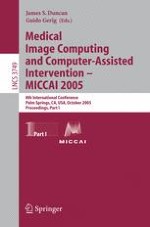2005 | OriginalPaper | Buchkapitel
Prospective Head Motion Compensation for MRI by Updating the Gradients and Radio Frequency During Data Acquisition
verfasst von : Christian Dold, Maxim Zaitsev, Oliver Speck, Evelyn A. Firle, Jürgen Hennig, Georgios Sakas
Erschienen in: Medical Image Computing and Computer-Assisted Intervention – MICCAI 2005
Verlag: Springer Berlin Heidelberg
Aktivieren Sie unsere intelligente Suche, um passende Fachinhalte oder Patente zu finden.
Wählen Sie Textabschnitte aus um mit Künstlicher Intelligenz passenden Patente zu finden. powered by
Markieren Sie Textabschnitte, um KI-gestützt weitere passende Inhalte zu finden. powered by
Subject motion appears to be a limiting factor in numerous magnetic resonance imaging (MRI) applications. For head imaging the subject’s ability to maintain the same head position for a considerable period of time places restrictions on the total acquisition time. For healthy individuals this time typically does not exceed 10 minutes and may be considerably reduced in case of pathology. In particular, head tremor, which often accompanies stroke, may render certain high-resolution 2D and 3D techniques inapplicable. Several navigator techniques have been proposed to circumvent the subject motion problem. The most suitable for head imaging appears to be the orbital or spherical navigator methods. Navigators, however, not only lengthen the measurement because of the time required for acquisition of the position information, but also require additional excitation radio frequency (RF) pulses to be incorporated into the sequence timing, which disturbs the steady state. Here we demonstrate the possibility of interfacing the MR scanner with an external optical motion tracking system, capable of determining the object’s position with sub-millimeter accuracy and an update rate of 60Hz. The movement information on the object position (head) is used to compensate the motion in real time. This is done by updating the field of view (FOV) by recalculating the gradients and the RF-parameter of the MRI tomograph during the acquisition of k-space data based on the tracking data. Results of rotation phantom, in vivo experiments and the implementation in two different MRI sequences are presented.
